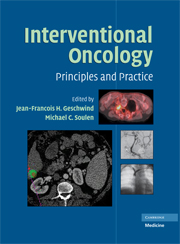Book contents
- Frontmatter
- Contents
- FOREWORD
- ACKNOWLEDGMENTS
- CONTRIBUTORS
- PART I PRINCIPLES OF ONCOLOGY
- PART II PRINCIPLES OF IMAGE-GUIDED THERAPIES
- PART III ORGAN-SPECIFIC CANCERS
- 9 Hepatocellular Carcinoma: Epidemiology, Pathology, Diagnosis and Screening
- 10 Staging Systems for Hepatocellular Carcinoma
- 11 Hepatocellular Carcinoma: Medical Management
- 12 Surgical Management (Resection)
- 13 Liver Transplantation for Hepatocellular Carcinoma
- 14 Image-guided Ablation of Hepatocellular Carcinoma
- 15 Embolization of Liver Tumors: Anatomy
- 16 Transcatheter Arterial Chemoembolization: Technique and Future Potential
- 17 New Concepts in Targeting and Imaging Liver Cancer
- 18 Intrahepatic Cholangiocarcinoma
- 19 Medical Management of Colorectal Liver Metastasis
- 20 Surgical Resection of Hepatic Metastases
- 21 Clinical Management of Patients with Colorectal Liver Metastasis Using Hepatic Arterial Infusion
- 22 Colorectal Metastases: Ablation
- 23 Colorectal Metastases: Chemoembolization
- 24 Radioembolization with 90Yttrium Microspheres for Colorectal Liver Metastases
- 25 Carcinoid and Related Neuroendocrine Tumors
- 26 Interventional Radiology for the Treatment of Liver Metastases from Neuroendocrine Tumors
- 27 Immunoembolization for Melanoma
- 28 Preoperative Portal Vein Embolization
- 29 Cancer of the Extrahepatic Bile Ducts and the Gallbladder: Surgical Management
- 30 Extrahepatic Biliary Cancer: High Dose Rate Brachytherapy and Photodynamic Therapy
- 31 Extrahepatic Biliary Cancer/Biliary Drainage
- 32 Surgical and Medical Treatment
- 33 Percutaneous Renal Ablation
- 34 Embolotherapy in the Management of Renal Cell Carcinoma
- 35 Epidemiology, Diagnosis, Staging and the Medical-Surgical Management of Lung Cancers
- 36 Image-guided Ablation in the Thorax
- 37 Interventional Treatment Methods for Unresectable Lung Tumors
- 38 Interventional Neuroradiology in Head and Neck Oncology
- 39 Percutaneous Ablation of Painful Metastases Involving Bone
- 40 Intra-arterial Therapy for Sarcomas
- 41 Prostate Cryoablation: A Role for the Radiologist in Treating Prostate Cancer?
- PART IV SPECIALIZED INTERVENTIONAL TECHNIQUES IN CANCER CARE
- INDEX
- Plate section
- References
11 - Hepatocellular Carcinoma: Medical Management
from PART III - ORGAN-SPECIFIC CANCERS
Published online by Cambridge University Press: 18 May 2010
- Frontmatter
- Contents
- FOREWORD
- ACKNOWLEDGMENTS
- CONTRIBUTORS
- PART I PRINCIPLES OF ONCOLOGY
- PART II PRINCIPLES OF IMAGE-GUIDED THERAPIES
- PART III ORGAN-SPECIFIC CANCERS
- 9 Hepatocellular Carcinoma: Epidemiology, Pathology, Diagnosis and Screening
- 10 Staging Systems for Hepatocellular Carcinoma
- 11 Hepatocellular Carcinoma: Medical Management
- 12 Surgical Management (Resection)
- 13 Liver Transplantation for Hepatocellular Carcinoma
- 14 Image-guided Ablation of Hepatocellular Carcinoma
- 15 Embolization of Liver Tumors: Anatomy
- 16 Transcatheter Arterial Chemoembolization: Technique and Future Potential
- 17 New Concepts in Targeting and Imaging Liver Cancer
- 18 Intrahepatic Cholangiocarcinoma
- 19 Medical Management of Colorectal Liver Metastasis
- 20 Surgical Resection of Hepatic Metastases
- 21 Clinical Management of Patients with Colorectal Liver Metastasis Using Hepatic Arterial Infusion
- 22 Colorectal Metastases: Ablation
- 23 Colorectal Metastases: Chemoembolization
- 24 Radioembolization with 90Yttrium Microspheres for Colorectal Liver Metastases
- 25 Carcinoid and Related Neuroendocrine Tumors
- 26 Interventional Radiology for the Treatment of Liver Metastases from Neuroendocrine Tumors
- 27 Immunoembolization for Melanoma
- 28 Preoperative Portal Vein Embolization
- 29 Cancer of the Extrahepatic Bile Ducts and the Gallbladder: Surgical Management
- 30 Extrahepatic Biliary Cancer: High Dose Rate Brachytherapy and Photodynamic Therapy
- 31 Extrahepatic Biliary Cancer/Biliary Drainage
- 32 Surgical and Medical Treatment
- 33 Percutaneous Renal Ablation
- 34 Embolotherapy in the Management of Renal Cell Carcinoma
- 35 Epidemiology, Diagnosis, Staging and the Medical-Surgical Management of Lung Cancers
- 36 Image-guided Ablation in the Thorax
- 37 Interventional Treatment Methods for Unresectable Lung Tumors
- 38 Interventional Neuroradiology in Head and Neck Oncology
- 39 Percutaneous Ablation of Painful Metastases Involving Bone
- 40 Intra-arterial Therapy for Sarcomas
- 41 Prostate Cryoablation: A Role for the Radiologist in Treating Prostate Cancer?
- PART IV SPECIALIZED INTERVENTIONAL TECHNIQUES IN CANCER CARE
- INDEX
- Plate section
- References
Summary
THE NEED FOR SYSTEMIC THERAPIES IN HEPATOCELLULAR CARCINOMA
Recent years have seen major advances in local control of hepatocellular carcinoma (HCC), and the relevant approaches are described in detail elsewhere in this volume. Thus, although surgical resection (and orthotopic liver transplantation) has long been seen as the only approach to offer cure, or at least long-term survival, other locoregional therapies including percutaneous ethanol injection and thermal ablation now appear to be rivaling surgical resection by many criteria of efficacy. However, it is clear that all these approaches (including surgical resection) are less effective as the tumor increases in size, and conventionally, most are confined to lesions smaller than 5 cm in diameter. This probably reflects the fact that as tumors increase in size, the frequency of vascular invasion increases and with it, the likelihood of metastasis. Thus, if local treatments are applied to larger lesions then the rate of recurrence increases dramatically.
Similarly, trans-catheter approaches are recognized to cause extensive tumor necrosis, but evidence of survival improvement has been more difficult to demonstrate because disease progression and tumor re-vascularization are still the rule. Thus to complement these local measures, systemic treatment is urgently required to expand the indications for local therapies and to decrease the recurrence rate (i.e., in the adjuvant setting).
At the outset, it should be noted that, largely because of the progress in local treatment, systemic agents have moved “down the scale” so that new chemotherapeutic agents have been tried mainly in patients with advanced or even terminal disease and this necessarily limits the scope for observing effective treatments.
- Type
- Chapter
- Information
- Interventional OncologyPrinciples and Practice, pp. 115 - 120Publisher: Cambridge University PressPrint publication year: 2008



